Flash Comics #1 (1940)
“The Kidnapping of Johnny Thunder”
by John B. Wentworth & Stan Aschmeier
There is one last Golden Age character that debuts in the same issue of Flash and Hawkman but never rose to the same level of fame: Johnny Thunder.
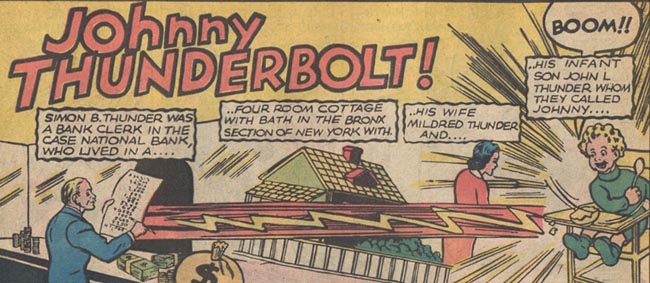
We begin with Johnny’s origin, when he was kidnapped as a baby by orange skinned aliens racist stereotypes.
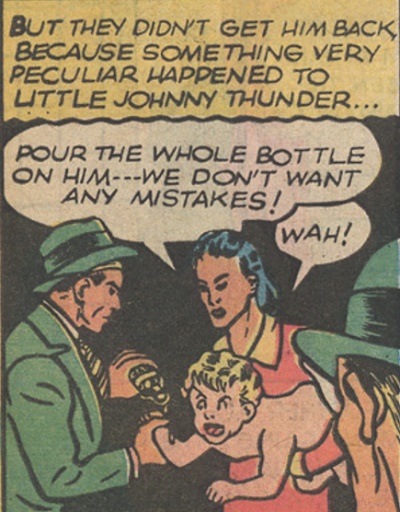
Yeah, uhm, this hasn’t aged very well… he’s disguised as an Asian by dumping lots of dye on him, and he’s taken to the fictional country of Badhnisia.
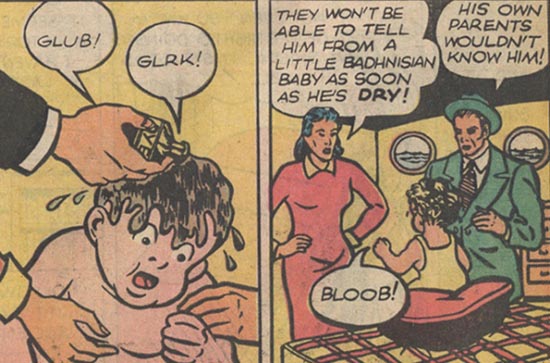
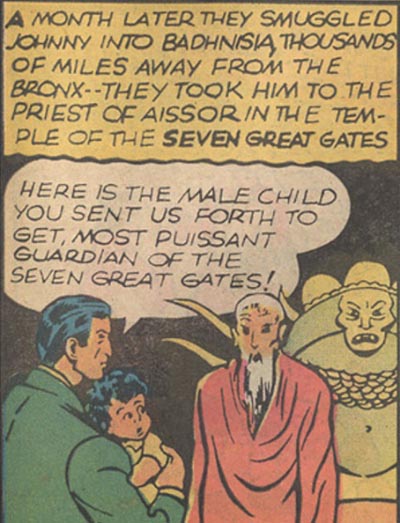
This is because Johnny was born at 7 AM on 07/07/1917, which for SOME reason is significant for Badhnisian religion.
If the numbering is that significant, wouldn’t a baby born on 07/07/1907 be more significant?
Also, not a single Badhnisian baby was born on the same day?
How small is that country?
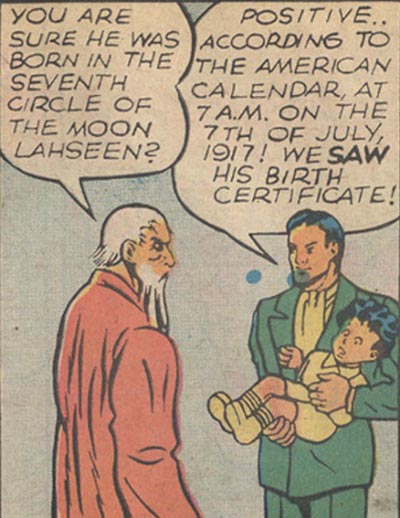
Not that much thought was put into having this make ANY sense.
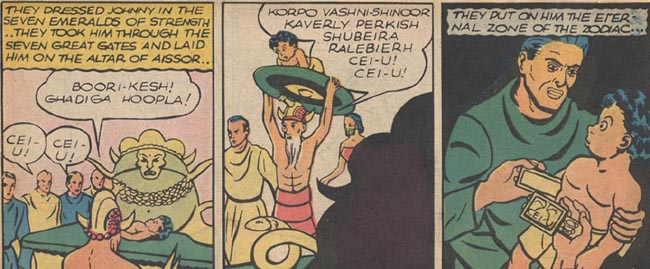
I’m with you, kid.
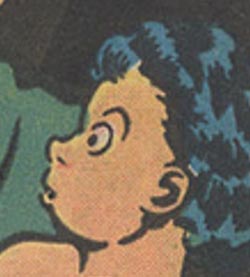
The magic word Cei-U, pronounced “Say-You”, is going to be massively important.
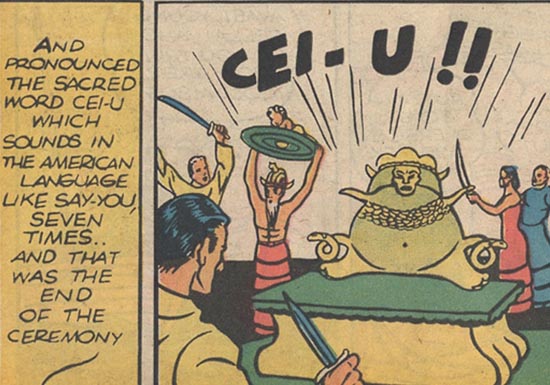
According to captions this is taking place in August 1918, so Johnny is 1 year old here.
First of all, with all this emphasis on seven, why isn’t he seven months old?
Second, that is a big 1 year old baby.
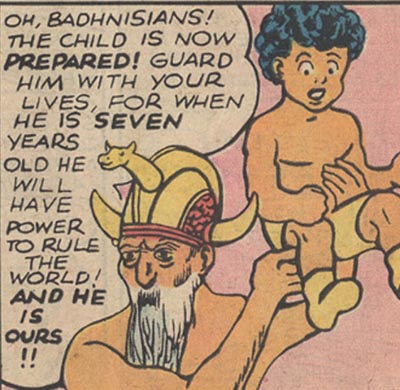
However Badhnisia is then attacked by an enemy country, so Johnny (who apparently keeps being painted orange) has to flee the country.
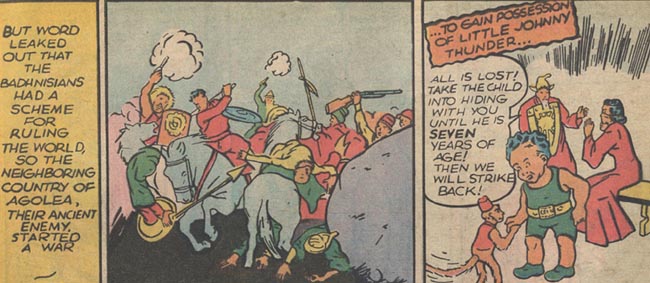
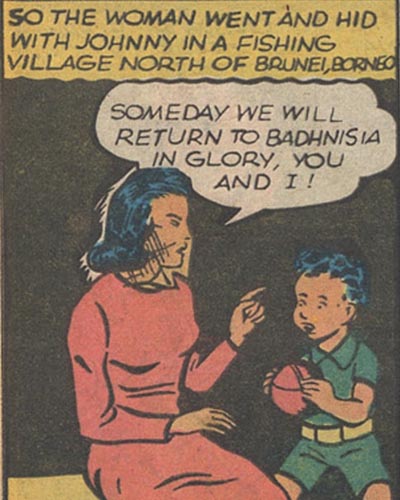
Oh come on, lady, YOU HAD ONE JOB!!!
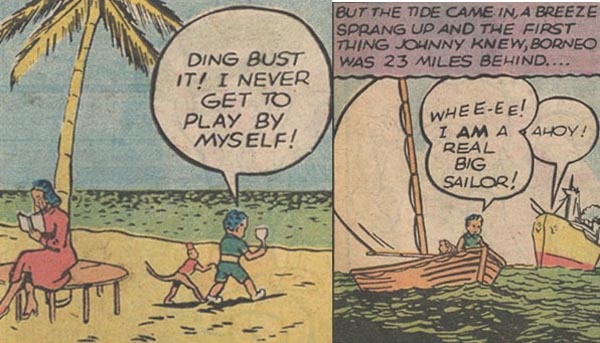
Johnny is rescued by sailors, who apparently are better at recognizing a lazy dye job than Badhnisians.
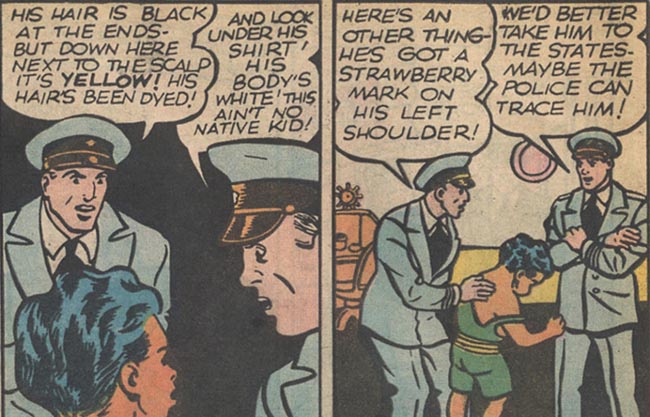
And so Johnny is reunited with his parents. His father must’ve taken his disappearance pretty bad, since he’s aged 50 years during Johnny’s absence.
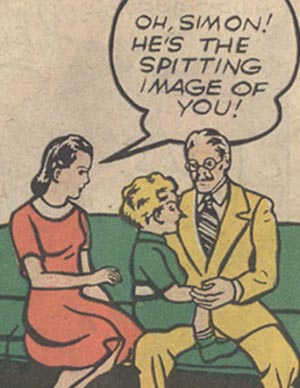
Johnny then grows extraordinarily lucky, sparing his family from a flood…
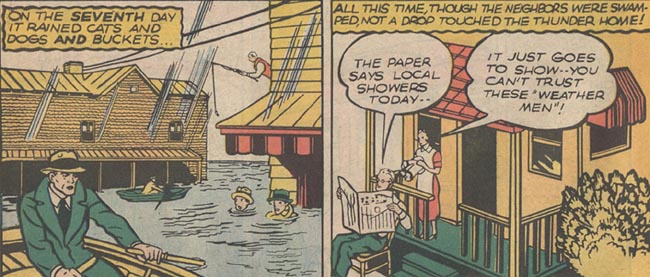
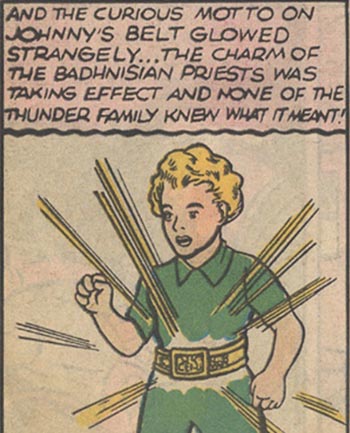
…and being hired on the spot, despite this being 1940 and as such not too far from the Great Depression.
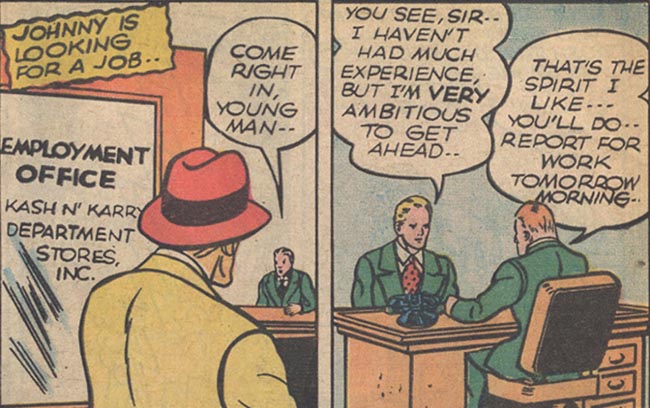
Specifically he’s hired as a window cleaner, a job that Johnny believes can be done without a sponge. Because as we will see, Johnny is both extraordinarily lucky and extraordinarily dumb.
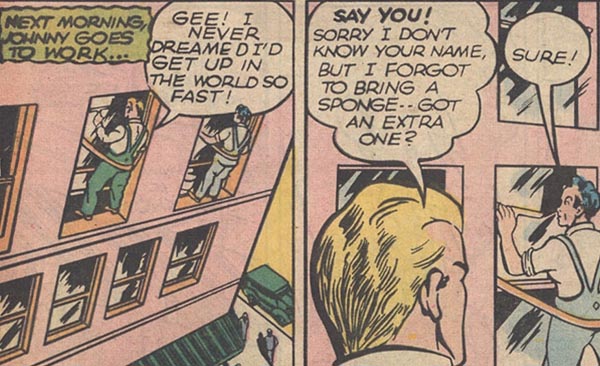
Since Johnny just pronounced the words “Say you”, this has unlocked his gimmick: whenever he says these words, his wishes are granted.
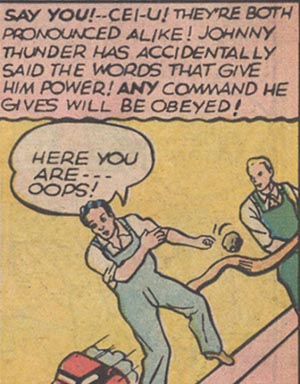
Am I the only one who has never heard the expression “go jump at a duck”?
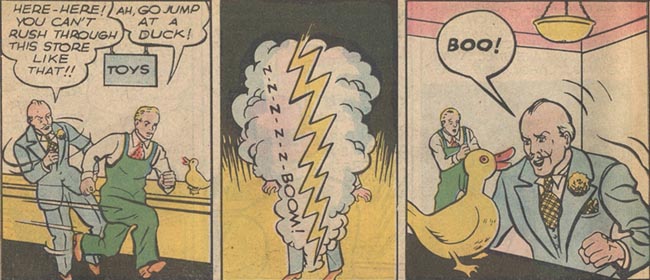
Johnny’s power also grants non-stupid wishes.
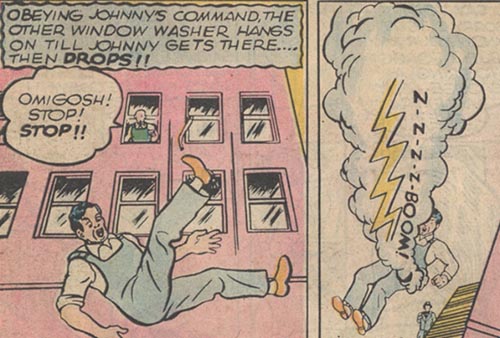
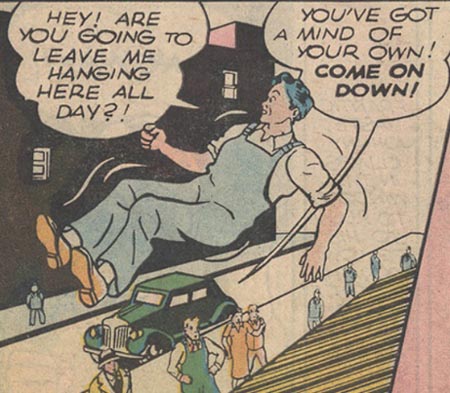
Apparently Badhnisia has spies all over the world, so they IMMEDIATELY know that Johnny has unlocked the power.
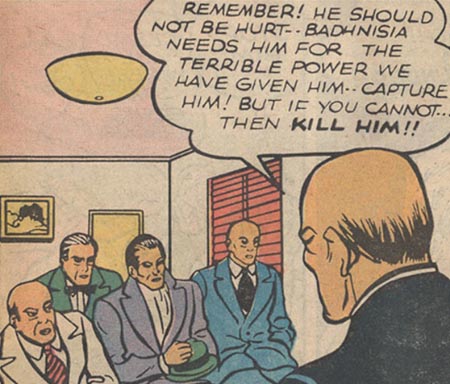
This is the first Golden Age comic I’ve encountered with so many expressions that I’ve never heard.
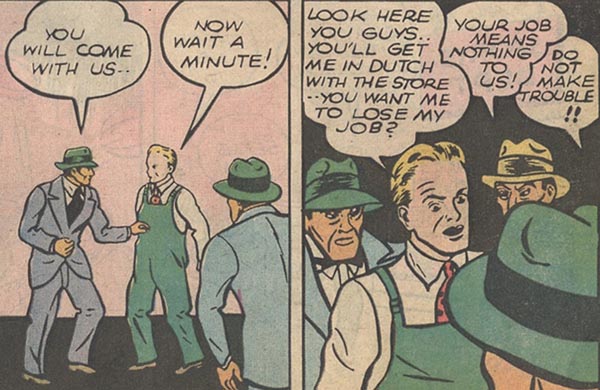
There’s a time limit on Johnny using the magic word, something that will lose importance once he learns how the power works.
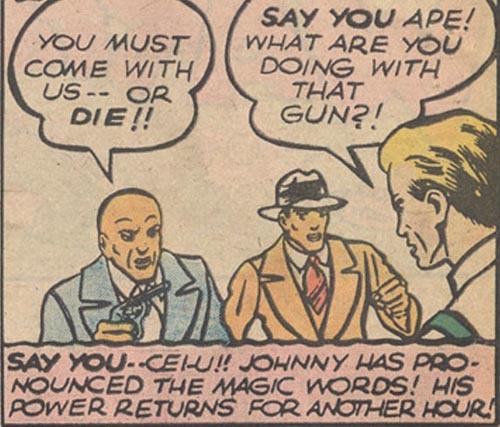
Johnny easily disposes of the Badhnisians, and it’s already the end.
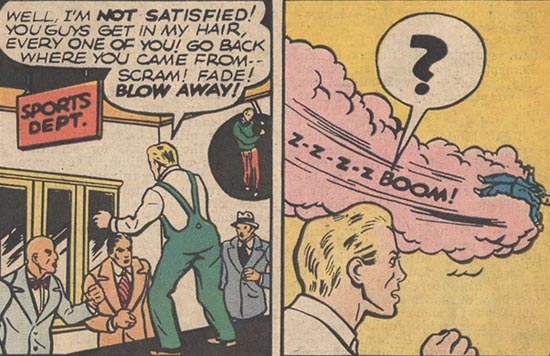
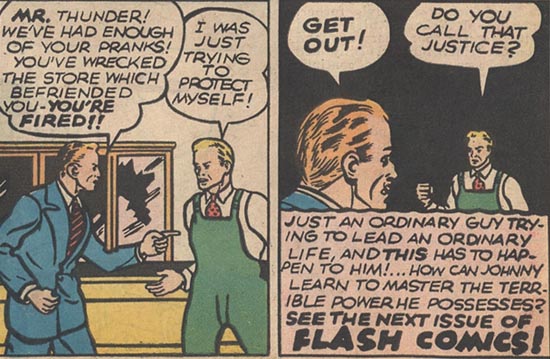
Well that was, uhm, that was ten pages.
This time I don’t have much to say about the creators.
John B. Wentworth has over a hundred Golden Age stories where he’s credited as the writer; his other almost famous creation is Sargon the Sorcerer.
Stan Aschmeier has over two hundred Golden Age stories where he’s credited as the penciler, buy he’s also written several stories including the creation of Dr. Mid-Nite.
I couldn’t find much else about them. Also please consider that A LOT of credits in the Golden Age are educated guesses, especially for writers.
In addition to the stories I’ve covered, there are three other comics and a couple of prose stories.
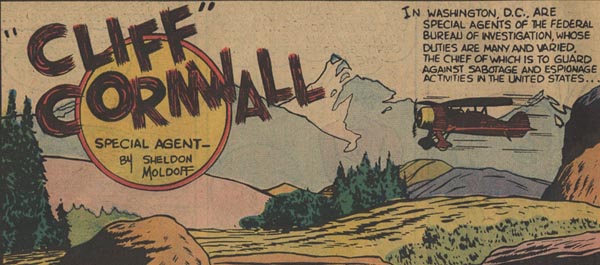
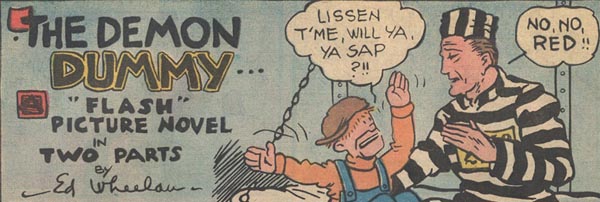
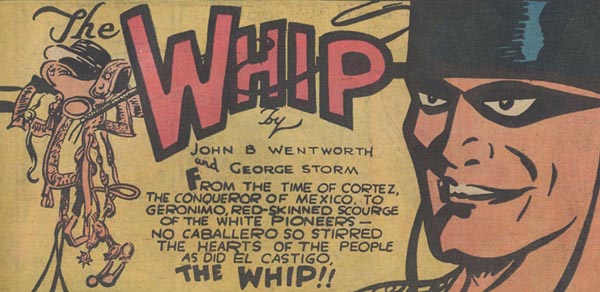
Historical significance: 3/10
Johnny is very easily the least important member of the Justice Society.
Silver Age-ness: 10/10
Leaving aside the convoluted plan to give Johnny powers… he STILL doesn’t get there are supernatural things around him!?
Does it stand the test of time? 0/10
Even without the depiction of Asians (which isn’t even that bad for the 40s, at least they talk like normal people), this is basically a humor comic that is not funny.
Obviously your mileage may vary on that, but this does absolutely nothing for me.
How close is this to the modern character? What modern character?
If you don’t know Johnny’s history, you’re probably wondering: what the heck does this guy have to do with superheroes?
Actually, come to think of it, you should think that regardless.
Johnny would learn on Flash Comics #8 that the reason behind his luck is that his magic word summons a magic thunderbolt named… Thunderbolt. Who starts off was a generic bolt but then is updated to a pink genie.
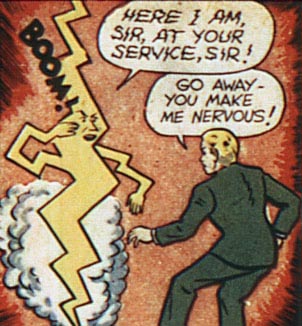
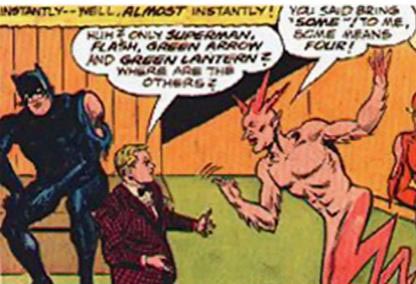
The gimmick is that Thunderbolt is MUCH smarter than Johnny, and doesn’t have trouble chastising him for being dumb.
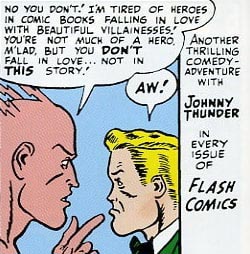
He probably would’ve faded into obscurity if, for some reason, he wasn’t chosen as a founding member of the Justice Society of America.
We’ll get there eventually, and we will cover the fact that Johnny was pushed off his own serial by a character introduced in one of his stories: Black Canary. Yes, really.
In a final insult, after the end of the series, a completely unrelated character with the same name debuted in All-American Comics… in a western.
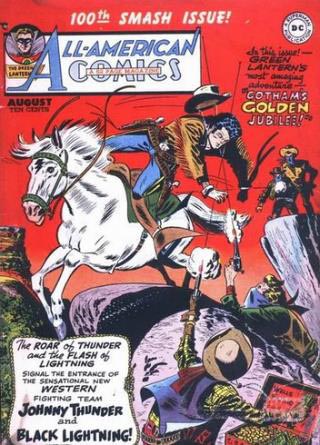
That won’t be the last time Johnny Thunder has his, uhm, thunder stolen: in 1985, Roy Thomas created Jonni Thunder… a detective that can turn into living lightning. As far as I know, she has no relationship with either Johnny Thunder.
Never read her, but I’ve always liked her design.
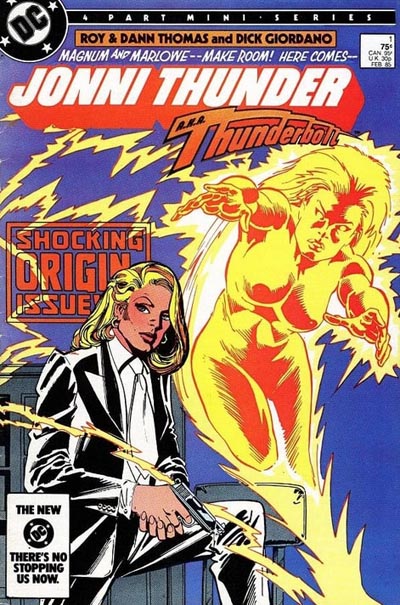
Going back to the Golden Age version: after the original Johnny Thunder lost his own series to Black Canary, he continued to have adventures with the Justice Society.
Until 1948 when he was kicked off the JSA and replaced by… wait for it… Black Canary AGAIN.
From the Silver Age onwards Johnny was around whenever there was a JSA storyline, but he slowly faded into the background.
In 1999, on the pages of JLA #28 by Grant Morrison, he was revealed to suffer from Alzheimer’s…
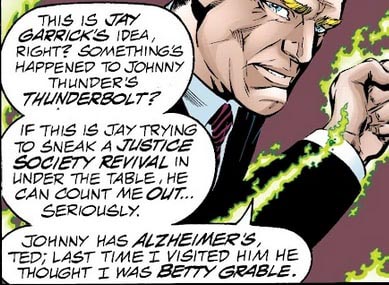
…and pass the Thunderbolt (who in the same storyline was revealed to be an imp from the 5th dimension) to a black kid named Jakeem.
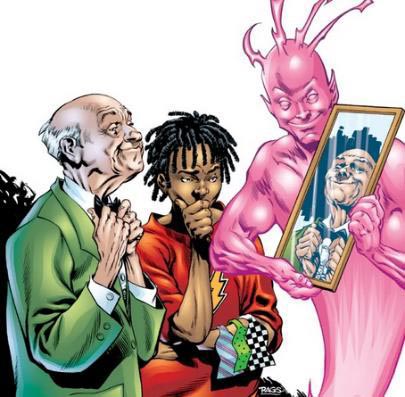
That’s the last time I read a story featuring Johnny Thunder; Jakeem basically took his place in the JSA. I haven’t read a ton of stories with Jakeem, but he’s FAR more tolerable than Johnny ever was.
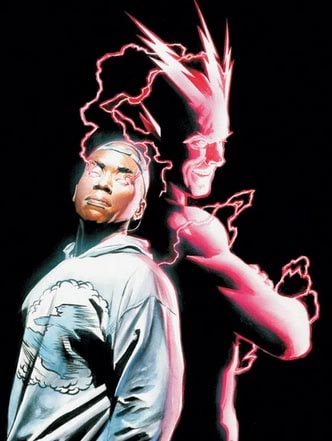
From what I can tell Johnny was later cured by Thunderbolt, then he died, then he had his soul merged with Thunderbolt. Comics, everybody!
I hope they stop trying to make Johnny a thing… he should have never been in superhero comics to begin with, and the only reason he has any connection with them is that he was in the Justice Society when comic relief characters were all the rage.

I never bothered to check and learn that Johnny Thunder’s origin was so involved. Thanks for putting that out.
One thing, though. Johnny was not a charter member of the Justice Society of America. Although he was a hanger-on in the first three JSA stories, he didn’t become a member himself until All Star Comics # 6 (Aug.-Sep., 1941). He replaced the Flash, who’d been relegated to honorary membership status.
In one of the early JLA-JSA crossovers, there’s an Earth-1 counterpart of Johnny who’s a villain and a lot smarter. (And he makes a return appearance in a later one of those crossovers, the one where they retcon the JLA’s Black Canary as the JSA one’s daughter.)
There’s no direct connection between Johnny Thunder and Jonni Thunder, but after the Crisis, Roy Thomas had Jonni Thunder guest-star in Infinity, Inc., because he was trying to include a modern analogue of every golden age JSA member (the same “logic” for tying in the Kirby red-and-gold Sandman to Infinity, Inc.). The only exception to this was Starman, which I assume would have become Star-Spangled Kid’s new name but plans for the Roger Stern Starman series were probably in motion, so he became Skyman instead. Oh, also Mister Terrific, I guess.
Jonni Thunder could only summon the lightning being (who in this case was just electrical with no magic powers). Have you looked at any of the Roy Thomas SECRET ORIGINS on these comic characters?
I’ve read a couple, but non with Johnny or Jonni.
You never heard to “be in Dutch” with? It’s a bit old-fashioned, but I’ve definitely encountered it before–don’t know the duck one, though.
Let’s give ol’ Johnny some credit. His levels of clueless ineptitude make Jimmy Olsen look like a genius.
The short-lived Justice Society of America series of 1992-3 treated Johnny much better without forgetting the lightweightedness of his character.
I particularly loved the exchange in the last issue—# 10 (May, 1993)—when the JSA is fighting the magical menace of Kulak and getting the worse of it. Johnny suddenly begins taunting the powerful villain, accusing him of being a fraud.
“What’s Johnny doin’?” spouts the Atom. “He’s provoking the guy!”
“Wait a minute!” Wildcat replies. “Johnny must have a plan. Get ready to move!”
“Johnny Thunder with a plan? Gimme a break!”
The thing was—Johnny really did have a plan, and it worked, too.